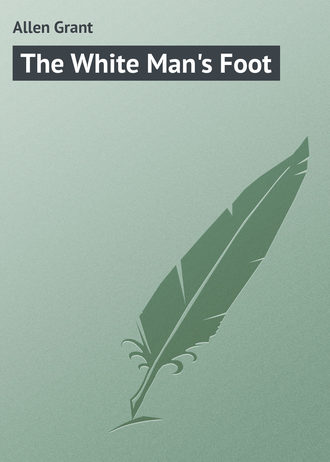 полная версия
полная версияThe White Man's Foot

Grant Allen
The White Man's Foot
DEDICATION
TO JERRARD GRANT ALLEN, THE ONLY BEGETTER OF THESE ENSUING ADVENTURESMy Dear Grantie,
From the following pages, written with a single eye to your own personal tastes and predilections, you may, I trust, learn three Great Moral Lessons.
First, never to approach too near the edge of an active volcano.
Second, never to continue your intimacy with a man who deliberately and wickedly declines to pull you out of a burning crater.
And third, never to intrust the care of youth to a cannibal heathen South Sea Islander.
With the trifling exception of these three now enumerated, I am not aware that you can extract any Great Moral Lesson whatsoever from the hairbreadth escapes of Kea and her associates.
Having thus almost entirely satisfied your expressed wishes in this matter – for "a story without a moral" – I subscribe myself, with pride,
Your obedient servant and very loving father,
G.A.CHAPTER I
My brother Frank is a most practical boy. I may be prejudiced, but it seems to me somehow there's nothing like close personal contact with active volcanoes to teach a young fellow prudence, coolness, and adaptability to circumstances. "Tom," said he to me, as we stood and watched the queer party on deck, devouring taro-paste as a Neapolitan swallows down long strings of macaroni: "don't you think, if we've got to live so long in a native hut, and feed on this port of thing, we may as well use ourselves to their manners and customs, whatever they may be, at the pearliest convenient opportunity?"
"Haven't you heard, my dear boy," said I, "what the naval officer wrote when he was asked to report to the Admiralty on that very subject of the manners and customs of the South Sea Islanders? 'Manners they have none,' he replied with Spartan brevity, 'and their customs are beastly.'"
"Not a bit of it," Frank answered quickly in his jolly way. "For my part I think this sticky, pasty stuff they're eating with their fingers, though it's a bit stodgy, looks like real jam, and I'd much rather take my lunch off things like that up here on deck, out of a native calabash, than go down and eat a civilized meal with a knife and fork in that hoky-poky, stuffy little cabin there."
I confess, for myself, I didn't exactly like the look of it. Cosmopolitan as I am, I object to fingers as a substitute for spoons. We were on board the Royal Hawaiian mail steamer Liké Liké, 500 tons registered burden, from Honolulu for Hilo, in the island of Hawaii; and a quainter group than the natives on deck I'm bound to admit, in all my wanderings, by sea or by land, I had never set eyes on. The tiny steamer was built in fact on purpose to accommodate all tastes alike, be the same savage or civilized. Down stairs was a saloon where regular meals in the European fashion were well served by a dusky Polynesian steward in a white linen jacket, to such luxurious persons as preferred to take them in that orthodox manner. But the unsophisticated natives, in their picturesque dress, believing firmly in the truth of the proverb that fingers were made before forks, liked better to carry their own simple provisions in their baskets with them. They picnicked on deck in merry little circles, laughing and talking at the top of their voices (when they weren't sea-sick) as they squatted on their mats of woven grass round the family taro-bowl. From this common dish, parents and children, young men and maidens, fed all alike, each dipping his forefinger dexterously into the sticky mess, and then twisting it round, as one might twist a lot of half-boiled toffee, till they landed it safely with a sudden twirl in their appreciative mouths. "It must be awfully good," Frank went on meditatively, eyeing the doubtful mixture with a hungry look. "They seem to enjoy it so, or else of course they wouldn't lick their fingers! I wish we could strike up a friendship now with some of these amiable light-coloured natives, and get them to share their lunch with us off-hand. I wonder what they call this precious stuff of theirs?"
"We call it taro," one of the nearest group answered, greatly to our surprise, in perfectly good and clear English. "Would you like to taste some? It's very nice. We shall be delighted if you'll try it. Hawaiians are always proud indeed to show any hospitality in their power to friendly strangers."
She was a pretty young girl of eighteen who spoke, lighter a good deal in complexion than most of the other natives around, and she was seated with a tall, dark, serious-looking old Hawaiian at a calabashful of the strange pasty mixture the appearance of which had so attracted Frank's favourable attention. As she spoke, she moved a little aside to make room for us on her mat, as if they were all playing Hunt-the-Slipper; and Frank, whose fault, I'm bound to admit, was never shyness, squatted down at once, nothing loth, tailor-fashion, on the deck by her side, and with many thanks accepted the courteous offer of a dip in the taro-bowl.
"Upon my word, Tom," he said, twirling a great dab of the queer-looking paste awkwardly into his mouth, "it's first-rate grub when you come to taste it. A little sour to be sure, but as good as pancakes. If you're going to feed us like this on the islands, sir," he added, turning to the stern old man, "I don't think we'll be in any hurry to run away again."
"Bring out some more food, Kea," the dark old Hawaiian half whispered to the girl politely, in English not quite so good as her own, but still very fluent, "and ask the gentleman," with a slight bow towards me, "if he won't be good enough to join us in our simple luncheon."
"I shall be only too glad," I answered, immensely surprised, and with some qualms of conscience about my unfortunate remark as to the manners and customs, which I never expected any native on board to understand. "It will be much more pleasant, I'm sure, to take my meals up here on deck than to go down to that hot and stuffy little saloon below."
As I seated myself, the girl Kea took up from her side a pretty basket of plaited palm-leaves, and produced from it a few pieces of dried fish, some cold roast pork, a stick or two of sugar-cane, several fresh oranges just picked from the tree, and a tempting display of bananas and bread-fruits. Frank and I were old enough sailors and old enough travellers to fare sumptuously off such excellent food stuffs; indeed we had just arrived in the Islands from San Francisco by the last mail steamer, and fresh fruit was a great luxury to us; while after so long a voyage on the open Pacific we thought nothing of this pleasant little summer cruise between the beautiful members of that volcanic archipelago.
A meal together is a capital introduction. In the course of ten minutes we were all four of us on excellent terms with one another. Kea had introduced to us the dark old man as her Uncle Kalaua, a Hawaiian chief of the old stock of some distinction, whose house was remarkable for being situated higher up the slopes of the great volcano, Mauna Loa, than any other on the entire island. She herself, she let us know by casual side-glimpses, was a half-caste by birth, though she hardly looked as dark as many Europeans; her mother had been Kalaua's only sister, and her father the captain of an English whaling-ship; but both were dead, she added with a sigh, and she lived now with her grim old uncle near the very summit of the great burning mountain. She told us a vast deal about herself, in fact, by way of introduction, with the usual frankness of the simple, unsophisticated children of nature, and she asked us a lot of questions in return, being anxious to learn, as we were neither missionaries, nor whalers, nor sugar-planters, nor merchants, what on earth our business could be in Hawaii.
"Well," said I, with a smile of amusement, "you'll think it a very funny one indeed when I tell you what it is. We've come to make observations on Mauna Loa."
"To make observations!" Kea answered with a faint thrill of solemn awe in her hushed voice. "Oh, don't say that. It's – it's so very dangerous." And she glanced aside timidly at her uncle.
Kalaua looked up at us quickly with a suspicious glance. "Observations on Mauna Loa?" he cried in a very stern tone. "On our great volcano? Scientific observations? The man is ill advised in truth who tries to go poking and prying too much about Mauna Loa!"
"Oh, you needn't be afraid," Frank answered laughing; "need they, Tom? It's not by any means our first experience of eruptions. My brother's an awful dab at volcanoes, you know. He's seen dozens; and he's been sent out to examine this one in particular by the British Association for the Advancement of Science. I'm his assistant-examiner, without salary. Sounds awfully grand that, doesn't it? But we mean to have a jolly lark in Hawaii for all that. Expenses paid, and all found; and nothing to do but to go down the crater and look about us. We expect to have a splendid time. There's nothing I love like a really good volcano."
But in spite of Frank's enthusiastic way of looking at the matter I could see at a glance that the mention of our object in visiting Hawaii had cast a shade of gloom at once over both Kea and her uncle. The old man seemed to grow moody and sullen; Kea was rather grieved and saddened. The rest of our meal passed off less pleasantly. It was not till we began to chew green sugar-cane together by way of dessert, that Kea's spirits at all returned. She laughed and talked then once more with native good-humour, showing us how to strip and peel the fresh cane, and making fun of us merrily because in our English awkwardness we got pieces of the fibre wedged hopelessly in between our front teeth. Yet even so I couldn't help suspecting that something was weighing upon her mind a little. Evidently they were either hurt or distressed that we should think of scientifically observing Mauna Loa. I wondered much whether they held the mountain too sacred a thing for inquisitive science to poke its nose into, or whether they only considered it too dangerous a crater for the bold explorer to meddle with carelessly. If it was merely the last, I didn't much mind. Frank and I were thoroughly at home with nasty-tempered volcanoes, and knew their tricks and their manners down to the ground far too well to be in the least afraid of them. I had been engaged in studying their manifestations indeed for the last six years; and Frank, who was born to face danger, had joined me in all my expeditions and explorations ever since he'd been big enough to carry a knapsack.
In the course of the afternoon however I happened to be standing with pretty little Kea near the bow of the steamer, while her uncle was slowly pacing the quarterdeck, immersed in conversation with a Hawaiian acquaintance. She was a graceful young girl, with a wreath of yellow flowers twined, Pacific fashion, round her broad straw hat, and another garland of crimson hibiscus thrown lightly like a scarf like one well-shaped shoulder. She glanced timidly round to see if Kalaua was well out of earshot; then, seeing herself safe, she said to me in a low, half-whispered voice, "If I were you, Mr. Hesselgrave, I'd give up the idea of exploring Mauna Loa."
"Give it up!" I cried. "Why, really, you know, that would be quite impossible! I've come all the way from England on purpose to visit it. Is the mountain so very dangerous then?"
Kea's voice dropped a tone lower still. "It's more than dangerous," she said very nervously. "It's almost certainly fatal."
"How so?" I asked. I was not easily frightened.
She hesitated a moment. Then she answered with a pained and half-terrified air, "Nobody in Hawaii will give you any assistance."
"Why not?" I inquired. "Are they all so dreadfully afraid of the volcano?"
"Not of the volcano," Kea replied with evident awe in her tone, "but of Pélé, of Pélé. – I suppose you've never even heard about Pélé, though!"
"Never!" I repeated, laughing unconcernedly. "Enlighten my darkness. Who is he, or what is it?"
"It's neither he nor it," the Hawaiian girl answered in a hushed voice. "It's she, if it's anybody. Pélé's the goddess who lives, as our people used once to believe, in a fiery cave at the bottom of Mauna Loa!"
"Nonsense!" I replied, amused at the girl's apparent superstition. "I thought you were all converted here long ago. You don't mean to say your people go on believing still in such childish nonsense as gods and goddesses?"
Kea's voice sank lower than ever, and she glanced around her with a frightened little gaze. "We don't worship them, you know," she answered apologetically, under her breath almost; "but we can't help believing there's somebody there, of course, some super-natural being, when we hear Pélé groaning and moaning and sobbing in the dead of night, or see her casting up huge red-hot stones and showers of lava, whenever she's angry." She paused a moment: then she added mysteriously in a solemn undertone. "There must be something in it. My father knew that. He was one of the bravest and most skilful whalers in the whole Pacific, and he always said there was something in it."
I hadn't the heart to answer her back. I didn't consider the captain of a whaling ship a conclusive authority on such a point of science; but I couldn't bear to interfere with the poor girl's touching belief in her dead father's supreme wisdom; so I abstained humanely from adverse criticism. "And your uncle?" I asked after a brief interval.
Kea seemed almost terrified at the question. "My uncle," she said, in a shuffling way, "knows one thing well – that, according to the firm tradition of our ancestors, if the White Man's Foot ever treads the inner floor of Pélé's home, the White Man himself must foil a victim that day to the anger of the goddess. It may be true, or it may be false: but at any rate, that was what our fathers told us."
I laughed again. She was so absurdly and profoundly in earnest about it all. "In that case." I said with a little bow, "I may as well make my will at once, and leave my property to my nearest relations, for it's all up with me. I mean to explore the crater myself, and, I need hardly tell you, Frank will accompany me. We'll call in some morning at the front door, and drop a card on this terrible Pélé. I hope the lady will have the politeness to be at home to receive visitors."
The girl shuddered. "Hush," she cried, with a terrified face. "Don't talk like that. Don't talk any more about the matter at all. You don't know what you're saying. My uncle is coming. I wouldn't for worlds he should overhear us. We don't believe in Pélé any longer, of course. But I hope for all that you'll never try to explore the crater."
At that very moment the old chief Kalaua, who had long been deeply immersed in talk with his friend at the stern, apparently discussing some serious subject, strolled up and joined us. He bowed once more as he approached, with the strange old savage Hawaiian politeness; for in courtesy of manner these Pacific Islanders could give points to most educated Englishmen. "I was thinking," he said, withdrawing his cigar and addressing me, "that if you and your brother really want to make explorations in Mauna Loa you couldn't do better than come up and stop at my house on the top of the mountain. It's nearest the summit of any in the island, and it would be a convenient place for you always to start from on your exploring expeditions. You'd save the long ride up the slopes. May I venture to offer you the hospitality of a humble Hawaiian roof? It's a nice warm house, European built – it was put up by my English brother-in-law, Kea's father; and I think we could manage to make you as comfortable as anybody in Hawaii. Is it agreed? What say you?"
"You would allow me to pay for our board and lodging, of course?" I answered interrogatively. "Otherwise I mustn't trespass so far as that on your kind indulgence."
The old native drew himself up at once with offended dignity. "I'm a chief," he replied with quiet emphasis. "The blood of the great Kamehameha the First flows in my veins. When I ask you to my house, I ask you as my guest. Don't offend me, I beg of you, by offering me money!"
I felt I had really hurt the old chief's pride and wounded his feelings, so I hastened to apologize with the best expressions I could summon up, and to protest that I hadn't the remotest intention of slighting in any way his generous offer. "In England," I continued, "we are not accustomed to be received by perfect strangers in such a princely style of open-handed hospitality."
Kalaua bowed. "It is well," he answered with stately dignity. "Come to my house, and you shall have all that my house affords freely. May we expect you to stop with us then? It will give myself and my niece the greatest pleasure in life, I assure you, to receive you."
Kea from behind framed her lips, to my surprise, into an emphatic "No." I saw it and smiled. She uttered no sound, but the old man seemed instinctively to recognize the fact that she was making signs to me. He turned round, half-angrily, though with perfect composure, and said something to her in Hawaiian, which I did not then fully understand, though I had been studying the language hard, with dictionary and grammar, all the way out on my voyage from England. Kea looked frightened and held her tongue at once. The old chief glanced back at me for a decisive answer. In spite of Kea's warning I thought the opportunity too good to be missed. "I shall be delighted," I answered with my warmest manner. "I'm sure it's most kind of you. How can I thank you enough? I had no idea you Hawaiians were so generously hospitable."
When I told Frank of it that young rascal remarked with a solemn grin, "Of course they're hospitable! Why, didn't they take in Captain Cook, and roast him and eat him, they were so very fond of him? I expect that's what this sober old fellow of yours means to do with us. He'll give a dinner-party in our honour when we get there, no doubt, and you and I will be the joints for the occasion. That's the Pacific way of welcoming a stranger."
CHAPTER II
"When we reached Hilo, I went ashore in a boat through the dangerous surf, and before arranging to go up the mountain with my host and his niece, I called first on an English merchant in the little palm-girt town, to whom we had letters of introduction from friends in Liverpool.
"Going to stop with Kalaua, eh?" the merchant said, as soon as we had named our particular business. "A very good house, too! You couldn't do better. Quite close to the very mouth of the crater, and right in the track of the great red-hot lava streams. You'll see Pélé kicking up a shindy there simply to perfection. Her majesty's been getting precious uneasy of late – rumbling and growling I shouldn't be surprised if you're just in the nick of time for a first-rate eruption."
"And what sort of person is my host?" I asked curiously. "He seems a very stern, old-fashioned cannibal."
Our new acquaintance laughed. "You may well say that," he answered smiling. "In the good old days – or the bad old days, whichever of the two you prefer to call them – you pays your money and you takes your choice – Kalaua, they say, was the hereditary priest of that grim goddess, Pélé. His house was built on the highest habitable point of the mountain where Pélé dwells, that he might be close at hand to appease the angry spirit of the great crater whenever she began to pour down lava over the banana-grounds and cocoanut plantations at the foot of the volcano. Many a fat pig, and many a basketful of prime taro that hard-looking old man has offered up in his time to Pélé – ay, and I dare say many a human victim, too, if we only knew it. But all that's over long ago, thank goodness. He's a Christian now, of course, like all the rest of them; a very respectable old fellow in his way, with a keen eye of his own to business, and a thorough comprehension of the state of the sugar market. He keeps a good house. You've fallen on your feet, I can tell you, for Hawaii, if you've got an invitation to stop for an indefinite time as a guest at Kalaua's."
I was glad to hear we had happened by chance upon such comfortable quarters.
We slept that night at a little Hawaiian inn at Hilo, where we dined most sumptuously off roast pig and baked plantains; and at six next morning, Kalaua himself wakened us up to start on our long ride up the great lone mountain.
When we sallied forth, four sure-footed ponies stood saddled at the door, and Kalaua, Kea, Frank, and myself, mounting our careering steeds (only they didn't career), began our ascent to the cloud-capped summit. Mauna Loa, that bald cone, is almost as high as any peak in the Alps, rising some 14,000 feet above sea level; but the ascent over the lava plains is gentle and gradual, and the top, in this warm and delicious climate, still remains far below the level of perpetual snow. Nevertheless it is a long and tedious ride, some thirty miles, from Hilo to the top; and our sure-footed little ponies clambered slowly on, planting their hoofs with the utmost deliberation on the treacherous surface of the rugged and honey-combed masses of lava. Frank and I were both quite tired out with their camel-like pace when we reached the summit. Kea and Kalaua, more accustomed to the ascent, were as fresh as daisies, and Kea, in particular, laughed and talked incessantly, though I fancied, she was ill at ease somehow, in spite of all her apparent merriment.
At last, after crossing a wide expanse of broken blocks of black basalt, as big as the largest squares of freestone used in architecture, and then sliding and gliding over a hideous expanse of slippery, smooth lava, like ice for glassiness, we pulled up, wearied, at a house built close on the very summit, European or rather American, in its style and arrangements, but comfortable and even wealthy-looking in all its appointments. It was composed of solid volcanic stone, cut into large square masses, and round it ran a pleasant wooden verandah, with rocking-chairs temptingly displayed in a row under its broad canopy. An oleander blossomed profusely by the side, and tropical creepers of wonderful beauty festooned the posts and balconies with their hanging verdure and their trumpet-shaped flower-bells.
"Come in," Kea cried, leaping down with ease from her mountain pony, which a native boy seized at once and took away to the stables. "Come in, and make yourselves at home in our house. Dinner will be ready in twenty minutes."
"I should hope so," Frank answered, with his free-and-easy manner; "for I'm free to confess I want my grub awfully after such a long ride. And then I shall go out and inspect this precious volcano we hear so much about."
Kalaua's brow darkened somewhat, as if he didn't like to hear Mauna Loa so cavalierly described, and he murmured a few words in Hawaiian to Kea, in which I could only catch the name of Pélé, repeated very earnestly several times over.
The house was large, roomy, and well furnished, with bamboo chairs and neat native bedsteads; and the dinner, to which Frank at least did full justice, seemed to promise well for our future treatment under the old chief's hospitable roof. Kalaua himself grew somewhat less grim, too, as the meal progressed. Nothing thaws the soul like dinner. He warmed by degrees, and told us several amusing stories of the old heathen days, delighting Frank's heart by narrating, in glowing language, how, in his youth, he had charged, a naked warrior at the head of his naked troops, when Kamehameha the Second attacked the island. Frank was charmed to find himself so nearly face to face with aboriginal savagery. "And what did you do with the prisoners?" he asked inauspiciously.
The old man smiled a grimly terrible smile. "The less said about the prisoners the better," he answered at last, with some faint show of conventional reluctance. "Remember, we were heathens then, and knew no better. The English have come since and taught us our duty. We no longer fight; we are civilized now; we buy horses, and cultivate yam and bread-fruit and sugar-cane." And he helped himself as he spoke to another piece of fresh ginger.
I don't think Frank quite saw what he meant; but I confess a shudder passed through my own frame as I realized exactly what the old chief was driving at. It was strange to stand so very close to the lowest barbarism known to humanity. They had eaten the prisoners.









